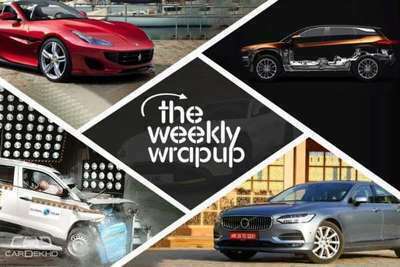Nutson Auto News Wrap-up Week Ending August 7, 2021
 |
 |
LEARN MORE: Links to full versions of today's news nuggets along with a million pages of the past 25 year's automotive news, articles, reviews and archived stories residing in The Auto Channel Automotive News Library can be found by just copying and then inserting the main headline into the News Library Search Box.
Nutson's Automotive News Wrap-up - Week Ending August 7, 2021; Below are the past week's important, relevant, semi-secret, or snappy automotive news, opinions and insider back stories presented as expertly crafted easy-to-digest news nuggets.
* The Biden administration made it official, proposing new vehicle emissions rules (aka "CAFE,") that would require U.S. automakers to push the average fuel efficiency of their fleets to 52 miles per gallon by 2026, from 24.9 MPG in the 2019 model year. The Biden plan calls for a 10% improvement in CO2 emissions/fuel economy in 2023, and 5% annually from 2024-26. That compares to 1.5% improvements required under the previous administration's plan, which was in turn a reversal of the Obama administration's 5% annual improvement standard.
* And, the EPA also estimated that by 2026, electric and plug in hybrid vehicles would account for 8% of U.S. vehicle sales. By 2030, EVs and PHEVs are supposed to account for 50% of new vehicle sales, Biden and Detroit automakers agreed at a White House event. Industry officials endorsed the 50% EV aspirational target as part of a package. The other part of the deal is a new emissions rule that offers automakers flexibility to reduce emissions without a ban on sales of the combustion trucks and SUVs that generate most of the industry's profits.
* Ford, GM and Stellantis announced their shared aspiration to achieve sales of 40-50% of annual U.S. volumes of electric vehicles (battery electric, fuel cell and plug-in hybrid vehicles) by 2030 in order to move the nation closer to a zero-emissions future consistent with Paris climate goals. Their recent product, technology, and investment announcements highlight their collective commitment to be leaders in the U.S. transition to electric vehicles. This represents a dramatic shift from the U.S. market today that can be achieved only with the timely deployment of the full suite of electrification policies committed to by the Administration in the Build Back Better Plan, including purchase incentives, a comprehensive charging network of sufficient density to support the millions of vehicles these targets represent, investments in R&D, and incentives to expand the electric vehicle manufacturing and supply chains in the United States. With the UAW at their side in transforming the workforce and partnering with them on this journey, they believe they can strengthen continued American leadership in clean transportation technology through electric vehicle innovation and manufacturing.
* Separately, BMW, Ford, Honda, Volkswagen, and Volvo Cars, the automakers who partnered with California when the previous administration attempted to roll back federal vehicle emissions standards, released a joint statement regarding the Biden Administration’s move to set new federal vehicle emissions standards. * The bipartisan compromise on infrastructure cuts in half President Joe Biden’s call for $15 billion to build 500,000 electric vehicle charging outlets, raising the stakes as the administration seeks to win auto industry cooperation on anti-pollution rules to curb climate change. The Senate legislation provides $7.5 billion in federal grants to build a national network of charging outlets, an amount that analysts say is a good start but isn’t enough to spur widespread electric vehicle adoption. The Biden administration had planned to build a half-million charging units around the country to fulfill a campaign promise and nudge a significant number of Americans into zero-emission vehicles by 2030.
* Buried deep in the 2,700-page bipartisan infrastructure bill is a provision that mandates all cars manufactured from 2027 onwards be equipped with a drunk driver monitoring system, in the hopes of ending a behavior that results in about 10,000 deaths in the U.S. every year. If passed with this provision, the bill would give a firm release date to a research program the federal government and an automotive industry group have collaborated on for more than a decade.
* Various media outlets report that Toyota is dropping its Avalon sedan from the lineup after the 2022 model. In spite of sales being up this year, it's the lowest volume sedan in Toyota's lineup. Overall there is still good sedan demand in the marketplace, but large sedans are suffering the most decline.
* Speaking of dropping models, Acura will kill the NSX supercar after the 2022 model. But first, the 2022 Acura NSX is officially getting the Type S variant we've long wondered about. Details on the NSX Type S transformation will come on August 12 when it's revealed at Pebble Beach.
* Here’s a fun fact from Autotrader: minivan sales grew by 84% during the second quarter of 2021. Yeah, you say, wasn’t every new-car segment up between April and June 2021 compared to the positively dismal prior year? Right you are, but few higher-volume segments grew at the pace of minivans. And what’s most remarkable is that the minivan segment consists of just five choices: two Chrysler vans, a Honda, a Toyota, and a new Kia. In many ways, 2021 has been the perfect storm for minivans to make a comeback — and have they ever.
* The Cox Automotive July U.S. auto sales forecast anticipated a slower sales pace due to lack of inventory, but some automakers have already posted strong, forecast-beating results, demonstrating their ability to manage through tight inventory. The sales pace overall, which had been averaging nearly 17.0 million a month through May, showed another decline as expected as falling inventories are halting sales activity around the country. Cox Automotive forecasts the July sales pace to fall to 15.2 million, down from June’s 15.4 million level, the third consecutive monthly pace decline after hitting a post-COVID-19 peak in April.
* Used-vehicle prices set a record at the end of June, according to a Cox Automotive analysis of vAuto Available Inventory data. The average listing price for used vehicles surpassed the $25,000 mark for the first time – $25,101 to be exact. The average listing price was 26% higher than at the end of June 2020 and 29% higher than 2019.
* Barrett-Jackson Holdings, the parent company of Barrett-Jackson Auction Company, has announced the acquisition of the Phoenix-based Collector Car Network Inc., including its well-known properties ClassicCars.com, AutoHunter, The ClassicCars.com Journal and the Future Collector Car Show. The acquisition furthers Barrett-Jackson’s mission to grow the collector car market through strategic alignment of best-in-class brands and world-class customer service.
* The 2021 New York International Automobile Show at the Jacob K. Javits Convention Center has been cancelled due to the growing incidences of the COVID-19 Delta variant and the increased measures announced recently by State and local officials to stop its spread. It's the second time the show was canceled for this year.
* Subaru is recalling certain vehicles because a fuel pump may fail, causing the engine to suddenly stall. If this happens while the vehicle is in motion, it could cause a crash. The models involved are 2019-2020 Ascent SUVs, 2018 Forester SUVs, 2018-2020 Impreza hatchbacks and sedans, 2018-2020 Legacy sedans, 2018-2020 Outback SUVs, 2018-2019 WRX sedans, and 2018-2019 BRZ coupes.
* Reports are that Volkswagen is issuing a stop-sale for some of its new Taos small utility vehicle. According to Automotive News, the automaker issued the stop-sale on models with all-wheel drive amid customer reports of engines turning off after the vehicle comes to a stop. VW is working on a fix for the issue.
* Sometimes you can't catch a break. First Covid-19, then microchip short and now this. New Ford vehicles including F-150 pickup trucks were being carried by a train that derailed in northeastern Missouri. Photos taken by aerial photographer Del Buckman and shared on social media and credited by KHQA-TV, the CBS/ABC affiliate in Hannibal, Missouri, show more than 15 train cars piled up almost like a children's toy set or a tornado destruction site. This all reported by The Detroit Free Press.
Stay safe. Be Well.


